外研版高一年级(必修4) Module 3Grammar 1
外研版高中英语必修4 Module3 Grammar,Listening and Vocabular
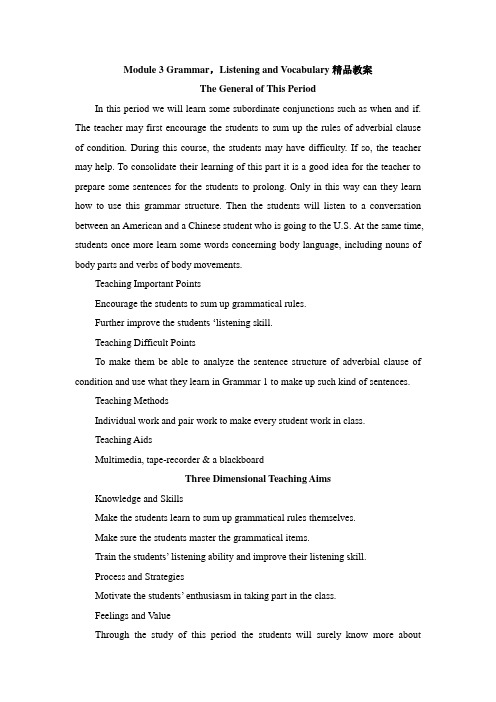
Module 3 Grammar,Listening and Vocabulary精品教案The General of This PeriodIn this period we will learn some subordinate conjunctions such as when and if. The teacher may first encourage the students to sum up the rules of adverbial clause of condition. During this course, the students may have difficulty. If so, the teacher may help. To consolidate their learning of this part it is a good idea for the teacher to prepare some sentences for the students to prolong. Only in this way can they learn how to use this grammar structure. Then the students will listen to a conversation between an American and a Chinese student who is going to the U.S. At the same time, students once more learn some words concerning body language, including nouns of body parts and verbs of body movements.Teaching Important PointsEncourage the students to sum up grammatical rules.Further improve the students ‘listening skill.Teaching Difficult PointsTo make them be able to analyze the sentence structure of adverbial clause of condition and use what they learn in Grammar 1 to make up such kind of sentences.Teaching MethodsIndividual work and pair work to make every student work in class.Teaching AidsMultimedia, tape-recorder & a blackboardThree Dimensional Teaching AimsKnowledge and SkillsMake the students learn to sum up grammatical rules themselves.Make sure the students master the grammatical items.Train the students’ listening ability and improve their listening skill.Process and StrategiesMotivate the students’ enthusias m in taking part in the class.Feelings and ValueThrough the study of this period the students will surely know more aboutadverbial clause of condition and understand the importance of knowing about different customs and culture by listening.Teaching ProceduresStep 1 Revision and lead-in(Greet the students as usual.)The teacher check the students’ homework of yesterday—reciting or retelling the reading passage.(The teacher asks a few students to do this.)Step 2 Grammar 1T:Okay, so much for the check-up. You must have spent much time preparing it and gave good performances just now. During your preparation course, you may take notice of many sentences which are linked by conjunctions when and if, right? Do you know the structures of these sentences? Now follow me to learn them this class. In this period we are going to deal with Grammar 1 and Listening and vocabulary part. First please open your books and turn to Page 23.Look at the following sentences from the passage. Read them and pay attention to the conjunctions when and if. They are used to connect sentences or parts of sentences. Then finish the exercise below.(The teacher gives the students two or more minutes to prepare.)(Two or more minutes later.)T: Have you yet finished it?Ss: Yes.T: Now look at the screen and see if your choices are correct.(The teacher shows the answers on the screen.)Suggested answers:The following statements are true: 1, 3, 4 and 5T:Well done! From the above two sentences and exercise we can get some information about adverbial clause of condition. It describes common situations which were introduced by when and if. Meanwhile, it usually explains the result of the situation in the other part of the sentence and uses the present tense in both parts. If the main clause is located at the beginning of the whole sentence, adverbial clause。
高中英语 外研版 必修四 Module3 Grammar(共22张PPT)

•
- Crazy English
2020/6/3
5
Adverbial clause of condition(条件状语从句)
Conclusion Ⅰ 主将从现(talking about future)
If you come ealier, you will see him tomorrow.
= Come ealier and you __w__i_ll__s_e__e_____ (see) him
引lo导n_g_条_a件_s_,状_ss语_oo_从_lloo_句n_n的g_g_连asa接,s
Youosnhaclol ngdeittaiopnrtizheat_,__o__n__c_o_n__d_i_tion that
providing/provided, if (suppose),
unless (if…not) p_r_o_v_i_d_i_n_g__/ _p_r_ovided
you p时a态ss要th求e :fin主al将ex从am现s.
只要你期末考试通过,你将获得一份奖励。
2020/6/3
8
Adverbial clause of concession(让步状语从句)
Enjoy a song and fill out the blankets.
Right here waiting
如果工作是一种乐趣,生活则是一种享受; 如果工作是一种义务,生活则是一种苦役。
Conclusion Ⅱ 主现从现(talking about situations or habits)
when也可以用来表示条件意味=if
2020/_g_ as
Conclusion Ⅲ 词常见的有:as
外研版高一年级(必修4) Module 3Listening and vocabulary

f. You shouldn’t talk about politics or religion. ____ g. You mustn’t leave as soon as you finish the meal. _______ h. You must thank your host for a wonderful evening. ______ i. You mustn’t arrive early. _______
5. The book I was looking for was staring me in the face. 我找的书其实就在我面前。 我找的书其实就在我面前。 6. It’s rude to stare. 盯着人看是没有礼貌的。 盯着人看是没有礼貌的。 7. He was staring out over the fields. 他目不转睛地看外面的田野。 他目不转睛地看外面的田野。 8. She was staring into the distance/ not space. 她凝视着远方。 她凝视着远方。
5. Let’s drink a ______ to our friendship. toast 6. Mr. Smith made a _______ that I request should help him.
Thank you!
What to talk about: f When to arrive for dinner: e, i How to meet new people: a When to leave the table: g Gifts: b,c What to call people: d What to say to the host when you leave: h
外研版高中英语必修一 Module3 Grammar教案-新版

A. development B. developingC. developed D. develop
5. I have collected the money ____.
A. needing B. needC. to need D. needed
a used car一辆旧车
a car used一辆用过的车
2)过去分词短语作定语通常后置,其作用相当于定语从句。如:
the color TV set produced last year =the color TV setthat were producedlast year
3)要注意过去分词做定语时动作发生的时间:
Learn & do exercise
Learn & do exercise
10’
24’
27’
1’
板书
Unit 3 My first ride on a train
The 3rd Period
Grammar
-ed分词既可以作前置定语,也可以作后置定语。
1)单个的过去分词作定语
(1)作前置定语:这时过去分词的形容词意义强于动词意义。
(2)表示与句中谓语动词相应的经常性的动作。如:
He was then a professor respected (that was respected) by all the teachers and students of the college.
当时他是一个受这所大学里全体师生尊敬的教授。
2. Practice
学生送的礼物
外研版高中英语必修三module3语法

5. He said, “Mother, the boy is very naughty.”
→He _____ very naughty. A. said his mother that the boy was B. said to his mother that the boy is C. told his mother that the boy was D. spoke to his mother that the boy
“Don’t be late again.”
→The teacher told the student not to be late again.
2. “Wake him up,” she said to me.
→ She told me to wake him up.
21
5. 过去时如有表示具体年份的状语,不 必改变时态。
2. “Have you seen the film?” he asked me.
→He asked me _______. A. had I seen the film B. have I seen the film C. if I have seen the film D. whether I had seen the film
→She asked whether we came from the same city.
19
3. 引语为特殊疑问句时,可以保留疑 问词,后跟陈述句。
1. He asked me, “Where are you going?”
→He asked me where I was going.
2. She asked him, “Whom do you want to see?”
2019-2020年高中外研版英语必修一教学案:Module4SectionⅢGrammar—现在完成时(含答案)

2019-2020年高中外研版英语必修一教学案:Module 4 Section Ⅲ Grammar —现在完成时(含答案)语法图解探究发现①It’s been six years since we last saw each other, you know.②And this is the first time I’ve visited your hometown.③I’ve seen quite a lot of China and I’ve visited some beautiful cities.④But this is one of the most attractive places I’ve been to.⑤They’ve put up a lot of high-rise buildings recently.⑥My wife’s just bought a beautiful dress from one of the shops there.⑦Xiao Li has lived in Xiamen all his life.⑧The family have lived in the town for twenty years.⑨Up to now, I’ve understood everything the teacher said.⑩He has gone to the Great Wall.[我的发现](1)现在完成时的构成是:have/has+过去分词。
(2)由例句①可知,现在完成时可与since 引导的时间状语从句连用。
(3)由例句⑤⑥⑦⑧⑨可知,现在完成时可与时间状语recently,_just, all his life, for_twenty_years,_up_to_now 连用。
(4)由例句④⑩可知,have/has_been_to 表示“曾经去过(某地)”;have/has_gone_to 表示“已经去了(某地),去而未归”。
外研版高中英语必修4 Module3 Grammar精品课件

D.so that
解析:选 C 。句意:他准备好了相机,万一看见能拍
一张好照片的东西(就可以拍下来了)。结合句意可知应
选in case,“以防,万一”。even if “即使”;if only“要
brings value to the ቤተ መጻሕፍቲ ባይዱife of others.
A.so that
B.no matter how
C.as long as
D.except that
解析:选 C 。考查连词。句意:只要一个人给别人的
生活带来价值,那么他的生命就有价值。as long as意为
“只要”,符合句意。so that意为“以便,结果”;no
Grammar
条Zx.xk件状语从句和让步状语 从句
一、条件状语从句 条件状语从句是表示主句动作发生的前提或条件的
从句。 1.条件状语从句中的时态
条件状语从句中主句和从句之间的时态要保持一致。 (1)当主句和从句的谓语动词都是单纯陈述过去的事情时,
主句和从句都可用一般过去时。 If it rained, I went to work by taxi. 如果天下雨,我坐出租车去上班。
2.if和unless引导条件状语从句 if表示正向条件,意为“如果”;unless表示反向条件,意为 “除非,如果不”。 If you ask him, he will help you. 如果你请求他,他会帮助你。
You will fail to arrive there in time unless you start earlier. 如果你不早点动身,你就不能及时赶到那儿。 [点津] ①if引导的条件状语从句既可以表示真实条件,又 可以表示与事实相悖或实现的可能性不大的非真实条件(虚 拟语气)。
英语外研版必修4课时作业 Module 3 Section Ⅲ Grammar
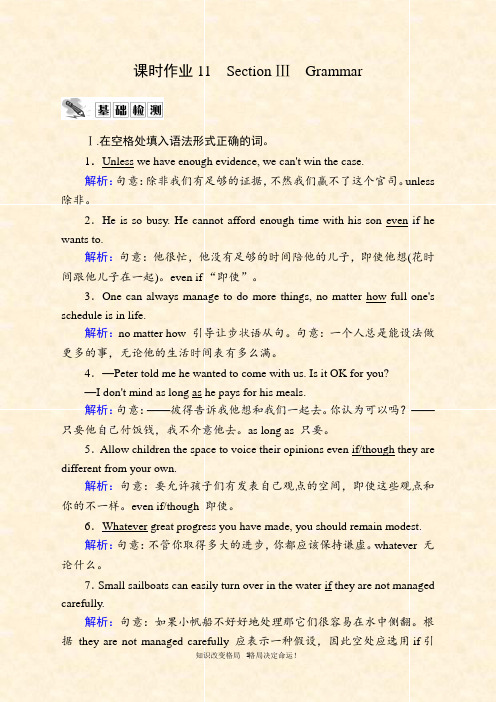
课时作业11Section ⅢGrammarⅠ.在空格处填入语法形式正确的词。
1.Unless we have enough evidence, we can't win the case.解析:句意:除非我们有足够的证据,不然我们赢不了这个官司。
unless 除非。
2.He is so busy. He cannot afford enough time with his son even if he wants to.解析:句意:他很忙,他没有足够的时间陪他的儿子,即使他想(花时间跟他儿子在一起)。
even if “即使”。
3.One can always manage to do more things, no matter how full one's schedule is in life.解析:no matter how 引导让步状语从句。
句意:一个人总是能设法做更多的事,无论他的生活时间表有多么满。
4.—Peter told me he wanted to come with us. Is it OK for you?—I don't mind as long as he pays for his meals.解析:句意:——彼得告诉我他想和我们一起去。
你认为可以吗?——只要他自己付饭钱,我不介意他去。
as long as 只要。
5.Allow children the space to voice their opinions even if/though they are different from your own.解析:句意:要允许孩子们有发表自己观点的空间,即使这些观点和你的不一样。
even if/though 即使。
6.Whatever great progress you have made, you should remain modest.解析:句意:不管你取得多大的进步,你都应该保持谦虚。
外研版高中英语必修四module3语法课件教学内容
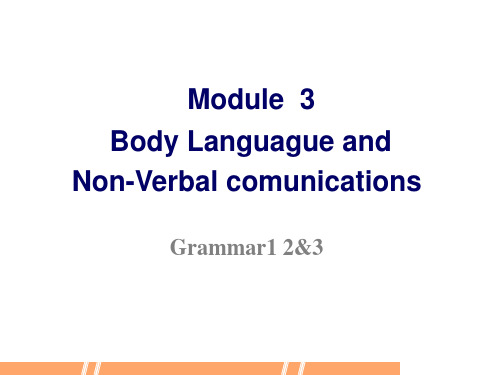
Grammar1 2&3
Grammar 1
Grammar 1-1 Look at these sentences from the passage. 1. If you say the word “communication”, most people think of words and sentences. 2. We use “learned” body language when we are introduced to strangers.
3. Please remind me of the meeting
again tomorrow ______ I forget.(2008
上海春)
A. thought
B. so that
C. in case
D. until
4. — Do you have a minute? I’ve got
something to tell you.
8. _H_o_w__e_v_er_ much I study, I find these exercises difficult.
(4) even if, even though 即使……, 纵使…
We’ll make a trip even if/though the weather is bad. 即使天气不好, 我们也要作一次旅行。 Even if he is poor, she loves him. (=He may be poor, yet she loves him.) 即使他很穷, 但她还是爱他。 Even though he is poor, she loves him. (=He is poor, yet she loves him. ) 尽管他很穷, 但她还是爱她。
外研版高一英语必修四module3 grammar (1)教学课件(18张ppt)
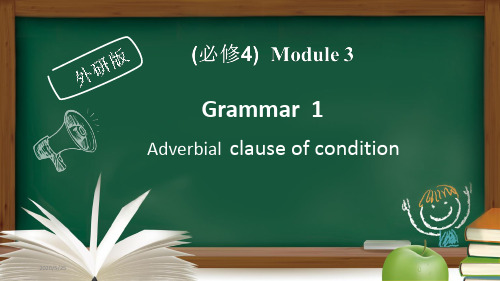
2020/5/25
9
另外还有in case, as/so long as In case it rains, do not expect me. 如若下雨, 就不要等我了。 As long as you promise to come, I’ll wait for you until you come. 只要你答应, 我就等你来。
11
但有些句子, 虽没有含条件关系的连词,却也隐 含着条件关系, 这些句子常用一些词, 如but for, without等引出一个介词结构来表示条件, 条件常常是虚拟的,或与事实相反的假设。如:
but for若非, 要不是
But for your help, we should not have finished in time.
2020/5/25
4
另外, if从句还表示不可实现的条件或根本不可 能存在的条件, 也就是一种虚拟的条件或假设, 从句多用一般过去时或过去完成时。如:
If I were you, I would invite him to the party. I would have arrived much earlier if I had not been caught in the traffic.
2020/5/25
10
从上述例句可以看出if, unless, on condition (that), supposing, provided等词引导的条件状 语从句, 主从句条件关系分明, 结构清晰。 在条件状语从句中, 用一般现在时代替一般将来 时, 一般过去时代替过去将来时。
2020/5/25
of the sentence. 5. use the present simple tense in both parts of the
外研选择性必修第四册Unit3 单元语法详解课件

testimony to how the Silk Road brought East and west together. (教材
P26)
c. Come a little bit closer so that you can get a better view. (教材 P26)
● since 的用法 ※ since 引导的状语从句中的谓语动词常用一般过去时且常为瞬间 动词,主句谓语常有现在完成时或一般现在时,且常为延续性动词, 请观察以下句子
a. It is just a week since we arrived here. b. He has lived in the city since I came here.
外研版新教材选择性必修四
Unit 3 The world meets China
单元语法详解
原创 Cao
2021
本单元重点语法
→ 状语从句
◆ 原句再现
a. You can only imagine how travellers felt when they saw the oasis of
Dunhuang ahead of them.(教材 P26)
c. He was watching TV last night while I was writing a letter. (同时发生)
※ while 引导的从句的谓语动词一般是延续性动词,且多用进行时; as则强调“一边….一边….”, 请观察以下句子
a. While we were having breakfast, John was talking on the telephone.
外研版高中英语必修四课件Module 3 grammar

____ But for the rain, we should have a
pleasant journey.
Grammar 1 – 3 Match the two parts of these sentences about body language in Europe or Amrica.
3. The volleyball match will be put off if
it ____B____.
A. will rain
B. rains
Байду номын сангаас
C. rained
D. is raining
4. — Shall Brown come and play computer games? — No,___C_____ he has finished his homework. A. when B. if C. unless D. once
The sentences from the passage… 1. describe common situations. 2. describe impossible situations. 3. use if or when to introduce the situation. 4. explain the result of the situation in the other part of the sentence. 5. use the present simple tense in both parts of the sentence.
up half an hour earlier.
_____ 3. As long as you work hard, you’ll
外研版高中英语必修4课文Module3英汉对照翻译带要点

外研版高中英语必修4课文Module3英汉对照翻译带要点Module 3: Ui Hua Culture VillageIn this module, we will explore the English and Chinese versions of the text from the English textbook for Grade 12 in the Foreign Language Edition (外研版) series. We will provide a detailed English translation along withkey points for each section. Let's begin!Part One: Chinese Version (中文版)我们从第一节开始,让我们看看中国的一个破旧村庄,文化贫困是这里最大的问题。
为了改善村庄的发展,当地政府提出了一些建议。
这些建议包括修建新学校、改善道路和提高村民生活水平等。
村民们也积极响应,他们团结一致,互相帮助,共同努力实现村庄发展的目标。
第二节详细介绍了乌天桥的历史和现状。
乌天桥是村庄最具代表性的建筑之一,但由于年久失修,现在面临着严重的危机。
政府希望通过修复乌天桥,恢复它的历史文化价值,并吸引更多的游客来到这里。
第三节谈到了对村庄进行改造的计划。
政府计划修建更多的景点,比如传统工艺馆、美食街等,以吸引更多的游客。
这些计划旨在促进该地区旅游业的发展,并改善村民的经济状况。
第四节讲述了村民们对修复乌天桥的热情参与。
村民们自愿参与修复工作,他们用自己的实际行动表达了对村庄发展的支持。
通过修复乌天桥,村民们希望能够改善他们的生活条件,吸引更多的游客和投资者。
第五节讨论了村民们的观点和感受。
对于一些村民来说,这个计划是一个机会,可以改善他们的生活水平。
但也有一些村民对这个计划持怀疑态度,他们担心传统文化可能在发展的过程中被丧失。
外研版高一英语必修4_Module3_Answers_to_Workbook_Exercises

Module 3 Answers to Workbook ExercisesGrammar1 1 You must apologize to the teacher.2 You must stand at the end of a bus queue.3 You should take a gift.4 You mustn’t touch the head of the child.2 1 f 2 e3 b4 a5 d6 c31 will make, stand 2 won’t co me, send 3 shall I take, invite 4 carry, ’ll make 5 ‘ll show, are4 1 Whatever 2 Wherever 3 Whoever 4 whatever5 Whenever6 However7 WhateverV ocabulary5 1 e 2 c/f 3 f 4 d 5 a/f6 b61 shake hands 2 point your finger 3 nod your head, shake your head 4 raise your eyebrows 5 bend your knees7 1 you clap 2 you hug him/her 3 laugh 4 smile 5 wave8 1 b 2 a 3 b 4 b 5 a 6 aReading9 gestures, physical contact, greeting people10 1 a 2 b 3 b 4 a11 1 Body language accounts for over 90% of communication during a conversation.2 Because you can communicate more efficiently.3 It gives you a general impression of someone and it helps you understand their emotions.4 It means OK.5 Both sexes can offer a handshake in the west. In Indonesia, a woman doesn’t offer a m an her hand unless they’re in a business situation.6 In many Asian countries, people of different sexes don’t touch each other in public. This is acceptable in Europe.7 Find out about the basic cultural codes before you leave home.Listening and Speaking12 Possible answers:1 In the west; it’s not customary for a guest to go down on his knees and kiss his hostess’s hand.2 Muslims don’t drink alcohol.3 You should find about the dress code before a party or event.14&15 TypescriptRP=Radio presenterRP: Sheila Smith is talking about gift-giving customs on Travel at Large this morning. Hello, Sheila.Sheila: Hello there. When you are travelling abroad, especially if you are doing business in a foreign country, it’s important to know about gift-giving customs. You don’t want to offend people by offering something inappropriate or offensive.RP: Are customs very different from one country to another?Sheila: Yes, they are. Take the US for example. Customs are relaxed there. You shouldn’t take a gift that is too expensive. That would be embarrassing. You can take a bottle of wine or a small personal gift if you know the person well. Otherwise, a box of chocolates is always a good idea.RP: And in Europe?Sheila: It’s very similar to the US.A bottle of wine or chocolates are always appreciated. Flowers are also a good idea for a woman. But avoid giving your hostess red roses. They are too romantic!RP: What about Asian countries?Sheila: Customs vary according to the culture. In India, you mustn’t give a gift m ade of leather. It could be made of cow’s hide and that is inappropriate in India.RP: And in Indonesia?Sheila: Customs are complicated there too, because there are different communities. Whoever invites you, never give a knife or anything with a sharp edgeas a gift. It suggests the end of a relationship.RP: And Japan?Sheila: Gift-giving rituals are also quite complicated in Japan. It’s not just what you give but there are rituals for how you give and how you accept a gift. For instance, you should always use both hands to offer or accept a gift. You also bow slightly. You shouldn’t open a gift immediately, but wait till later.RP: What about South American countries?Sheila: Customs are quite relaxed. Take Argentina for example, flowers, a dessert or chocolates are fine. But alcohol is an excellent choice because it is very expensive there—a bottle of wine or whisky.14 Answers4, 7,6,3,2,8,1,515 Answers1 Japan2 Indonesia3 India4 United States, Europe5 Argentina, Europe, United States6 Europe7 United States, Europe, Argentina8 Japan Writing17 A:formal B:informal18 A: Bring a bottle or a dessert and we’ll provide the rest! The host shouldn’t ask the guests to bring any gift to the party.B: I request the pleasure of your company a t my party. It’s not polite to request others to attend the party.19 Thank you, I am unable to accept. Please accept.。
高一英语必修4(外研版)3-3 Grammar
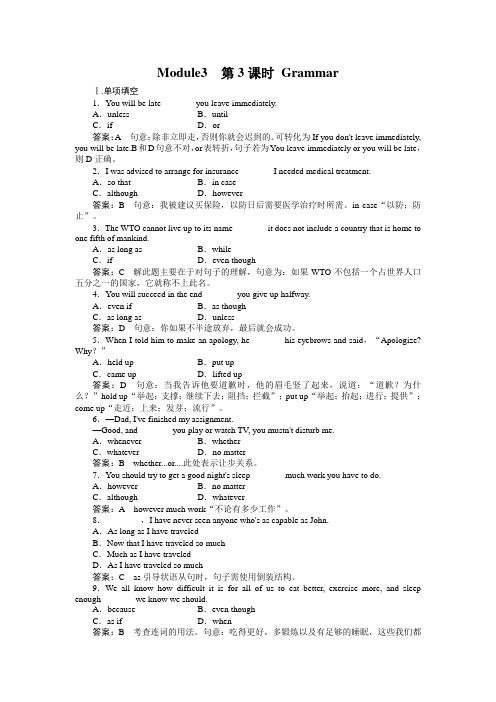
Module3 第3课时GrammarⅠ.单项填空1.You will be late________you leave immediately.A.unless B.untilC.if D.or答案:A句意:除非立即走,否则你就会迟到的。
可转化为If you don't leave immediately, you will be late.B和D句意不对,or表转折,句子若为You leave immediately or you will be late,则D正确。
2.I was advised to arrange for insurance________I needed medical treatment.A.so that B.in caseC.although D.however答案:B句意:我被建议买保险,以防日后需要医学治疗时所需。
in case“以防;防止”。
3.The WTO cannot live up to its name________it does not include a country that is home to one fifth of mankind.A.as long as B.whileC.if D.even though答案:C解此题主要在于对句子的理解,句意为:如果WTO不包括一个占世界人口五分之一的国家,它就称不上此名。
4.You will succeed in the end________you give up halfway.A.even if B.as thoughC.as long as D.unless答案:D句意:你如果不半途放弃,最后就会成功。
5.When I told him to make an apology, he________his eyebrows and said,“Apologize? Why?”A.held up B.put upC.came up D.lifted up答案:D句意:当我告诉他要道歉时,他的眉毛竖了起来,说道:“道歉?为什么?”hold up“举起;支撑;继续下去;阻挡;拦截”;put up“举起;抬起;进行;提供”;come up“走近;上来;发芽;流行”。
高中英语外研版必修4Module3 课件 (共72张PPT)

1. Guns and knives are two different types owf e_a_p_o_n. s 2. Someone who has a(n) __a_g_g_re_s_s_iv_e_ attitude may
be violent. 3. You can _g_r_e_e_t_ someone by saying “hello” 4. Your _p_o_si_t_io_nis the way you are sitting or standing.
b) I point to the way and say, “go this way please.”
c) I wave my hand and say “hello” d) I give him the gift and say,
“happy birthday to you”. e) I nod my head. f) I shake my hands and my head. g) I open my eyes wide pointing
You have to believe in yourself. That's the secret of success. 人必须相信自己,这是成功的秘诀。
Introduction – 3. Speaking What will you do when…?
1. meet a friend 2. show someone
2. Can you give reasons for your choice?
Reading – 1. Pre-reading What words come to you when seeing the picture?
外研版 必修四 Module3 Grammar(共22张PPT)
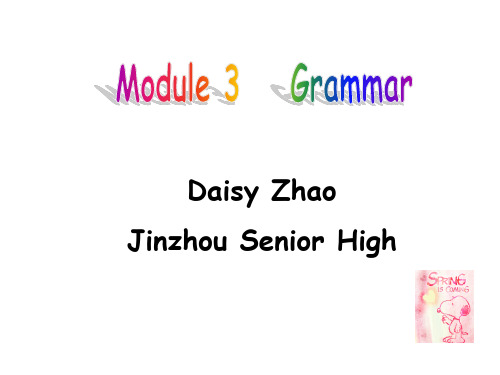
4)You, enter a house, you, take your shoes off
If you enter a house, you take your shoes off.
5) it, be sunny, she, fly a kite
If it is sunny, she will fly a kite.
Whoever = no matter who Whenever= no matter when However = no matter how Whichever = no matter which
Conclusion Ⅰ以上从属连词引导让步状语从句
Finish the exercises on P27
Too bad
• Peter wants to stay up late to watch a movie tonight, but he knows he shouldn’t. If he stays up late to watch a movie, he won’t get bed until after midnight. If he doesn’t get to bed until after midnight, he will probably be very tired in the morning. If he is very tired in the morning, he might oversleep. If he oversleeps, he will be late for work. If he is late for work, his boss might get angry and fire him. So, even though Peter wants to stay up late to watch a movie tonight, he isn’t going to. Too bad!
- 1、下载文档前请自行甄别文档内容的完整性,平台不提供额外的编辑、内容补充、找答案等附加服务。
- 2、"仅部分预览"的文档,不可在线预览部分如存在完整性等问题,可反馈申请退款(可完整预览的文档不适用该条件!)。
- 3、如文档侵犯您的权益,请联系客服反馈,我们会尽快为您处理(人工客服工作时间:9:00-18:30)。
其他的连词: 其他的连词
1. unless conj. 除非 若不 除非在 除非, 若不, 除非在……的时候 的时候 You will fail to arrive there in time unless you start earlier. 如果你不早点动身, 你就不能及时赶到那儿。 如果你不早点动身 你就不能及时赶到那儿。 Unless it rains, the game will be played. 除 非下雨, 比赛将照常进行。 非下雨 比赛将照常进行。
The sentences from the passage… 1. describe common situations. 2. describe impossible situations. 3. use if or when to introduce the situation. 4. explain the result of the situation in the other part of the sentence. 5. use the present simple tense in both parts of the sentence.
If I were you, I would invite him to the party. 如果我是你, 我会邀请他参加聚会。 如果我是你 我会邀请他参加聚会。 I would have arrived much earlier if I had not been caught in the traffic. 如果没有堵车, 我会到的早一点儿。 如果没有堵车 我会到的早一点儿。
外研版 高一年级(必修 必修4) 高一年级 必修 Module 3
Grammar 1 Adverbial clause of condition
Look at these sentences from the passage. If you say the word “communication”, most people think of words and sentences. We use “learned” body language when we are introduced to strangers. Now tick the true statements.
3) We shake hands when we make a deal. 4) When we greet someone, we put the right hand over the left and bow slightly.
Look at the sentences and answer the questions. a. If you meet someone you usually shake his/ her hand. b. What shall I do if I’m invited to dinner? c. Unless you’re very unlucky you’ll soon think of something.
but for若非 要不是 若非, 若非 But for the rain, we should have a pleasant journey. 要不是下雨, 我们的旅行肯定会很愉快。 要不是下雨 我们的旅行肯定会很愉快。 But for your help, we should not have finished in time. 要不是你帮忙, 要不是你帮忙 我们肯定不能及时完成任 务。
7. —Are you thinking about going to New York for the holiday? —No. But if I ________the time,I , would definitely go. A. have B. B had C. have had D. would have 8. If you ________this experiment,you , will understand the theory better. A. will be doing B. B have done C. will have done D. would do
我们知道, 我们知道 引导条件状语从句最常用的 连词是if, 连词是 由if引导的条件状语从句表示 引导的条件状语从句表示 在某种条件下某事很可能发生。 在某种条件下某事很可能发生。如: 如果你请他帮忙, 他会帮你的。 如果你请他帮忙 他会帮你的。 If you ask him, he will help you.
但有些句子, 虽没有含条件关系的连词, 但有些句子 虽没有含条件关系的连词 却也隐含着条件关系, 却也隐含着条件关系 这些句子常用一 些词, 些词 如but for, without等引出一个介 等引出一个介 词结构来表示条件, 条件常常是虚拟的, 词结构来表示条件 条件常常是虚拟的 或与事实相反的假设。 或与事实相反的假设。如:
Supposing it rains, shall we continue the sports meeting? 倘若下雨, 倘若下雨 我们的运动会还要继续举行 吗? Supposing something should go wrong, what would you do then? 假如出了什么问题, 你准备怎么对付? 假如出了什么问题 你准备怎么对付
If you fail in the exam, you will let him down. 如果你考试不及格, 你会让他失望的。 如果你考试不及格 你会让他失望的。 另外, 从句还表示不可实现的条件或 另外 if从句还表示不可实现的条件或 根本不可能存在的条件, 根本不可能存在的条件 也就是一种虚 拟的条件或假设, 拟的条件或假设 从句多用一般过去时 或过去完成时。 或过去完成时。如:
2. on condition (that)...在……条件下 条件下, 在 条件下 如果; 如果 on condition (that)...引导的条 引导的条 件从句是主句事件发生的前提条件或 唯一条件。 唯一条件。 I can tell you the truth on condition that you promise to keep a secret. 我可以告诉你真相, 我可以告诉你真相 条件是你答应保 守秘密。 守秘密。
Exercises
If I see her I’ll invite her to the party. (see, invite) 1. If you ____ a cake, your host ______ will be take very pleased. (take, be) 2. Unless the weather gets better, I ___ _______ will stay at home. (get, stay) 3. He _______ home early if he will go __________ doesn’t feel well. (go, not feel)
12. —The air is full of smoke and people are coughing. — It will get worse ________the government does something about the pollution. A. but B. unless C. except D. if B 13. I wonder if I________ time. If I ________time,I’ll go with you. , A. have;have B. will have;will have ; ; C. have;will have D will have;have D. ; ;
You can go swimming on condition (that) you don’t go too far from the river bank. 你只有在不远离河岸的条件下才可以 下水游泳。 下水游泳。 3. supposing conj. 如果 假如 如果, supposing引导的条件从句表示一种 引导的条件从句表示一种 假设条件
从上述例句可以看出if, 从上述例句可以看出 unless, on condition (that), supposing, provided等 等 词引导的条件状语从句, 词引导的条件状语从句 主从句条件关 系分明, 结构清晰。 系分明 结构清晰。 在条件状语从句中, 在条件状语从句中 用一般现在时代替 一般将来时, 一般将来时 一般过去时代替过去将来 时。
4. provided conj.假如 除非 以……为条 假如, 假如 除非, 为条 件 provided (that) +从句表示一种假设条 从句表示一种假设条 件。 He will sign the contract provided we offer more favorable terms. 如果我们提出更优惠的条件, 如果我们提出更优惠的条件 他就会在 合同上签字。 合同上签字。
1. Which sentences refers to a normal everyday situation? 2. Which sentences refers to a possibility in the future? 3. Which word in the third sentence mean if …not? The key: 1.a 2. b 3. unless
He won’t be against us in the meeting provided that we ask for his advice in advance. 如果我们提前征求一下他的意见, 如果我们提前征求一下他的意见 他 就不会在会上反对我们。 就不会在会上反对我们。
另外还有in 另外还有 case, as/so long as In case it rains, do not expect me. 如若下雨, 就不要等我了。 如若下雨 就不要等我了。 As long as you promise to come, I’ll wait for you until you come. 只要你答应, 我就等你来。 只要你答应 我就等你来。
